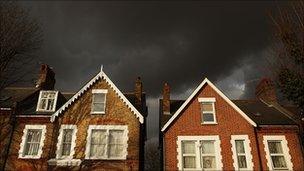UK home repossession levels are stable, says CML
- Published
Sue Anderson from the Council of Mortgage Lenders says the figures are good news but "we aren't necessarily out of the woods yet"
A total of 9,600 homes were repossessed in the UK in the first three months of the year, according to lenders.
This was identical to the same period of 2011, but up slightly on the previous quarter, the Council of Mortgage Lenders (CML) said.
It described the situation as "stable", suggesting that it might lower its forecast for the year as a whole in the summer.
It had predicted that repossessions would reach 45,000 in 2012.
'Last resort'
Homes are repossessed when mortgage borrowers fall behind on monthly payments and have little prospect of paying.
Low levels of interest and forbearance by lenders have kept a lid on the numbers since the banking crisis.
A total of 36,200 UK homes were repossessed in 2011 - the lowest annual total since 2007 and well below the peak of 75,500 that was seen in 1991.
The CML said that it expected this number to rise in 2012, but said it would reflect on its position in the summer.
Repossessions in the first three months of 2012 were higher than the 8,700 that took place in the fourth quarter of 2011, but this represented a normal seasonal pattern, the CML said.
Continuing pressures on household finances, changes to welfare benefits, and rising mortgage rates all had the potential to disrupt the current stable picture, it added.
"Anyone worried about their mortgage should be assured that lenders will try to help them get back on track, as long as this is a realistic prospect," said CML director general Paul Smee.
<bold>"</bold>Repossession really is a last resort, as the numbers show <bold>."</bold>
'Traumatic'
This was the case for Ann Phillips, who lives near Newcastle.

Thousands of people have found themselves falling behind with mortgage payments
The 71-year-old had lived in her home for 25 years, but it was repossessed after she found herself in problems with debt.
She said that losing her home was "traumatic".
"You lose most of your belongings because you cannot take them with you," she said.
"It is sad, but you have to move on - it is no good dwelling on it."
She warned others against taking on too much debt. She was being pursued by creditors and eventually sought help from the charity Christians Against Poverty.
After losing her home, the charity helped her to go through bankruptcy proceedings, which she said was a relief when completed.
Arrears figures
The CML said that fewer people had found themselves falling behind with mortgage payments in the first three months of the year.
The number of mortgages with arrears of 2.5% or more of the outstanding balance stood at 157,800 (1.4% of all loans), down from 160,300 at the end of December and 170,500 at the end of the first quarter of 2011.
However, within this, there was a slight rise, compared with a year ago, in those most likely to be tipped into repossession proceedings.
Those with arrears of 10% and over went up by 300 to 28,000 - the highest number since June 2000.
Regional picture
Separate figures from the Ministry of Justice revealed the situation for homeowners in England and Wales at an early stage in the repossession process.
There were 16,663 repossession claims - the earliest stage of the process - issued in the courts in the first three months of the year, a 5% fall on the previous quarter. This figure is seasonally-adjusted.
This led to 12,925 repossession orders being made, 3% lower than in the final quarter of 2011. About 50% of the orders were suspended, giving a clue to some of the leniency shown.
Suspension usually requires the defendant to pay the latest instalment of cash owed, plus some arrears, within a certain period. As long as they comply, the possession order cannot be enforced.
The north-west of England had the highest numbers of mortgage claims and claims leading to orders per 1,000 households. The lowest numbers were in the south-west of England.